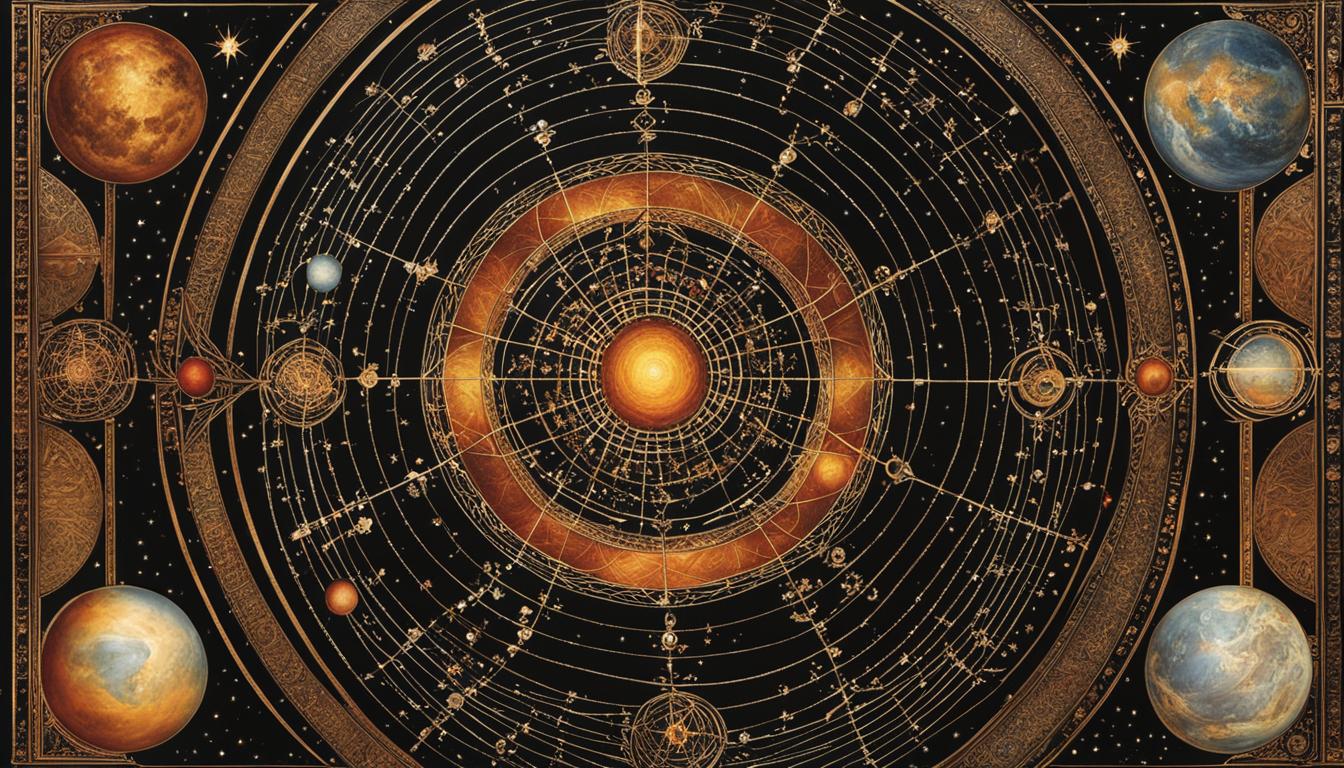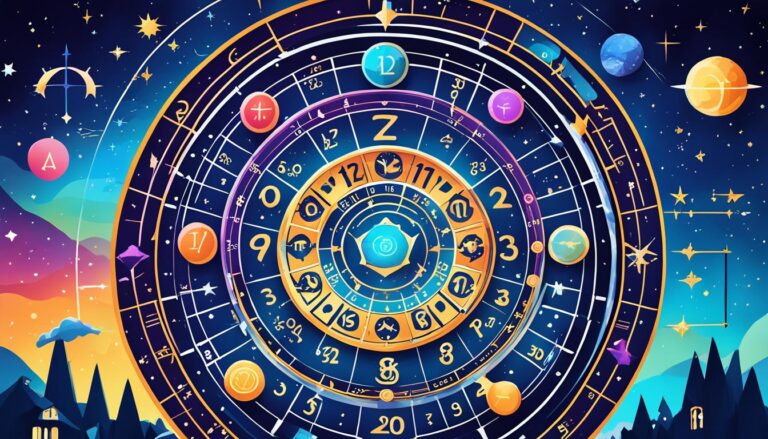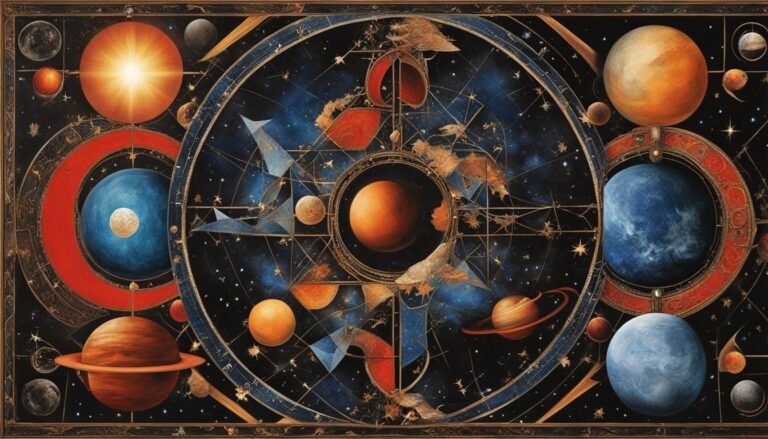How to Read Birth Chart in Vedic Astrology?
Are you curious to decode the secrets hidden within your birth chart? In Vedic astrology, understanding the birth chart can provide valuable insights into various aspects of your life. From relationships and career to spirituality and higher calling, the birth chart holds the key to unlocking your life’s purpose. But where do you start?
The first step to reading a birth chart in Vedic astrology is to familiarize yourself with the 12 houses. Each house represents a specific area of your life and has its own significance. By understanding the houses and their classifications, you can begin to decipher the cosmic influences shaping your destiny.
Key Takeaways:
- Understanding the 12 houses is essential to reading a birth chart in Vedic astrology.
- The houses are divided into good, bad, and neutral categories, determining their overall influence.
- Identifying the houses in the birth chart is the first step towards interpreting its complexities.
- Interpreting the classification of each house as good, bad, or neutral provides insight into various aspects of life.
- The power and importance of the houses are determined by their classification as cardinal, fixed, or cadent.
Identifying the Houses in the Vedic Birth Chart
The first step in understanding the birth chart in Vedic astrology is to identify the 12 houses. Each house corresponds to a specific area of life and holds its own significance. These houses are numbered and their positions are determined by drawing boundary lines on the chart. The top center house is known as the 1st house, and the houses are numbered in a clockwise direction.
To accurately interpret the birth chart, it is crucial to be able to identify and locate each house correctly. This allows for a comprehensive understanding of how the celestial energies influence different aspects of your life.
Here is a breakdown of the 12 houses in the Vedic birth chart:
- 1st House (Lagna): Represents the self, physical appearance, character, and overall vitality.
- 2nd House: Governs wealth, possessions, family, speech, and self-worth.
- 3rd House: Pertains to communication, siblings, short trips, and courage.
- 4th House: Represents home, family, ancestral property, and emotional well-being.
- 5th House: Governs creativity, romance, children, education, and intellect.
- 6th House: Relates to health, daily routines, conflicts, and service.
- 7th House: Pertains to partnerships, marriage, relationships, and business collaborations.
- 8th House: Represents longevity, transformation, hidden matters, and inheritance.
- 9th House: Governs spirituality, higher education, travel, and philosophical beliefs.
- 10th House: Pertains to career, reputation, social status, and public image.
- 11th House: Represents income, gains, friendships, aspirations, and achievements.
- 12th House: Governs solitude, spirituality, foreign travels, and hidden enemies.
By identifying each house in your Vedic birth chart, you can gain a deeper understanding of the specific areas of life that are influenced by the celestial bodies and their placement. This knowledge serves as the foundation for interpreting the birth chart accurately and gaining valuable insights into your unique astrological profile.
Interpreting the Good, Bad, and Neutral Houses
Once the houses are identified, it is important to understand their classifications in decoding your birth chart in Vedic astrology. The classification of each house as good, bad, or neutral plays a crucial role in your birth chart analysis.
Good Houses
Good houses bring positive influences and blessings into your life. These houses can indicate areas of strength, abundance, and growth. When planets are placed in these houses, they tend to amplify their beneficial qualities. The good houses in Vedic astrology include:
- 1st house – representing self, personality, and overall well-being.
- 2nd house – indicating wealth, assets, and family resources.
- 4th house – representing home, mother, and emotional well-being.
- 5th house – indicating creativity, children, and speculative gains.
- 9th house – representing spirituality, higher education, and long-distance travel.
- 10th house – indicating career, profession, and reputation.
- 11th house – representing gains, income, and fulfillment of desires.
Bad Houses
Bad houses in Vedic astrology present challenges and hurdles in your life. These houses indicate areas where you may face obstacles or experience difficulties. When planets are placed in these houses, they can bring in-depth transformation and karmic lessons. The bad houses in Vedic astrology include:
- 6th house – representing enemies, conflicts, and health issues.
- 8th house – indicating transformation, hidden matters, and sudden events.
- 12th house – representing losses, expenses, and spiritual liberation.
Neutral Houses
Neutral houses do not have a specific influence on their own. Their impact depends on the placement of planets in those houses. These houses are flexible and can be influenced by the neighboring houses. The neutral houses in Vedic astrology include:
- 3rd house – representing siblings, communication, and short-distance travel.
- 7th house – indicating partnerships, marriage, and significant others.
Understanding the classification of each house helps in decoding your birth chart in Vedic astrology. It provides insights into the overall dynamics of your birth chart and how various aspects of your life are affected. The houses act as a canvas on which the planets paint their cosmic influences, shaping your destiny and experiences.
Understanding the Power and Importance of the Houses
In Vedic astrology, the birth chart consists of 12 houses, each representing a specific aspect of life. These houses play a crucial role in determining the influence of planets and the overall dynamics of the chart. To accurately interpret the birth chart, it is important to understand the power and importance of these houses.
The houses in the birth chart can be further classified into three general categories:
- Cardinal or Kendra Houses: These houses are considered the most important and have a strong influence. They are the 1st, 4th, 7th, and 10th houses. Planets placed in these houses have a significant impact on your overall life path and destiny.
- Fixed or Panapara Houses: These houses have moderate strength and are the 2nd, 5th, 8th, and 11th houses. Planets positioned in these houses have a stable and enduring influence on various aspects of your life.
- Cadent or Apoklima Houses: These houses are seen as weakened and have relatively less power. They are the 3rd, 6th, 9th, and 12th houses. Planets placed in these houses may have a lesser influence and significance in the birth chart interpretation.
By understanding the hierarchy and classifications of the houses, you can gain valuable insights into the strength and significance of the planets located within them. This knowledge is essential in accurately interpreting the birth chart and uncovering the deeper meaning behind the planetary placements.

Dharma Trinity: The Path of Spiritual Action
The Dharma trinity consists of the 1st, 5th, and 9th houses in the birth chart. These houses provide valuable insights into your spiritual action and can reveal your life’s purpose. By analyzing these houses, you can gain a deeper understanding of your spiritual journey and the actions that align with your soul’s purpose.
Artha Trinity: Financial Prospects and Livelihood
The Artha trinity comprises the 2nd, 6th, and 10th houses. These houses shed light on your financial prospects and livelihood. By examining these houses in your birth chart, you can gain insights into your professional pursuits, wealth accumulation, and material success.
Kama Trinity: Relationships and Desires
The Kama trinity includes the 3rd, 7th, and 11th houses. These houses reveal valuable information about your relationships and desires. By delving into these houses in your birth chart, you can gain a deeper understanding of your interpersonal connections, romantic partnerships, and fulfillment of desires.
Moksha Trinity: Higher Calling and Spiritual Growth
The Moksha trinity encompasses the 4th, 8th, and 12th houses. These houses hold the key to unveiling your higher calling and spiritual growth. By exploring these houses in your birth chart, you can gain insights into your emotional well-being, transformative experiences, and spiritual evolution.
Understanding the trinities in your birth chart can provide valuable guidance and clarity on your life’s purpose. By decoding the birth chart in Vedic astrology and mastering birth chart analysis, you can embark on a transformative journey of self-discovery and align your actions with your true purpose.
Interpreting the Planets in the Birth Chart
The planets in the birth chart hold immense significance when it comes to shaping your life. Understanding their positions and influences can provide deeper insights into various aspects of your life’s journey. Let’s explore some essential tips for reading the birth chart in Vedic astrology.
1. Favorable Planets:
The Moon, Venus, Jupiter, and Mercury are considered favorable planets in Vedic astrology. These planets bring positive energy and impact the houses they are located in. Analyzing their placements within the birth chart can provide valuable information about the areas of life where you may experience growth, abundance, and harmony.
2. Unfavorable Planets:
On the other hand, certain planets like the Sun, Mars, Saturn, Rahu, and Ketu have the potential to negatively affect specific areas of your life. Understanding their placements within the birth chart can help you identify potential challenges or obstacles that you may encounter along your life’s path. By recognizing these influences, you can proactively work towards overcoming them and finding balance.
3. Zodiac Signs and Strength:
In addition to the planets, the zodiac signs in which they are placed further determine their strength and energy. Each zodiac sign has its unique qualities that influence how the planets express their energy. By studying the relationship between the planets and their zodiac signs, you can gain a deeper understanding of how these cosmic forces shape various aspects of your life.
Remember, interpreting the planets in the birth chart is a complex process that requires a comprehensive analysis of their positions, influences, and relationships. A skilled Vedic astrologer can provide personalized insights based on your birth chart, guiding you towards understanding yourself better and making informed decisions.
Conclusion
Unlocking the secrets of your life path through Vedic astrology can be a complex process. However, by developing a proper understanding of the houses, classifications, trinities, and planetary influences, you can gain valuable insights into various aspects of your life.
The birth chart serves as a guide, offering guidance and helping you make important decisions. By delving into the intricacies of your birth chart, you can gain a deeper understanding of your destiny and navigate through life’s challenges with clarity and purpose.
Remember, interpreting your birth chart is a journey of self-discovery. It allows you to uncover the hidden potential within you and harness it for personal growth and fulfillment. So, take the time to explore the depths of your birth chart and embrace the wisdom it unveils. Your birth chart is a powerful tool that can empower you to live a life aligned with your true purpose.
FAQ
How do I read a birth chart in Vedic astrology?
Reading a birth chart in Vedic astrology involves understanding the 12 houses and their classifications, as well as the positions and influences of the planets in the chart. By analyzing these factors, you can gain insights into various aspects of life and make more informed decisions.
How do I identify the houses in a Vedic birth chart?
Each house in the birth chart is represented by a specific area and has its own significance. The houses are numbered and their positions are determined by drawing boundary lines in the chart. Accurately identifying the houses is crucial for interpreting the birth chart correctly.
What do the good, bad, and neutral houses indicate in a birth chart?
The classification of houses as good, bad, or neutral determines the overall influences they have in your life. Good houses bring positive energy, bad houses present challenges, and neutral houses depend on the placement of planets for their impact. Understanding these classifications is key to interpreting the birth chart.
How do the classifications of houses affect the birth chart analysis?
The houses in the birth chart are classified as cardinal, fixed, or cadent, which determines the power and importance of the planets located in each house. Cardinal houses are considered the most influential, fixed houses have moderate strength, while cadent houses are weakened. Understanding this hierarchy helps accurately interpret the birth chart.
How can I discover my life’s purpose through the birth chart?
The birth chart in Vedic astrology provides insights into life’s purpose through various trinities or groups of houses. The Dharma trinity reveals spiritual actions and purpose, the Artha trinity provides information about financial prospects and livelihood, the Kama trinity offers insights into relationships and desires, and the Moksha trinity unveils higher calling and spiritual growth.
How do I interpret the planets in the birth chart?
The planets in the birth chart play a significant role in shaping one’s life. Favorable planets bring positive energy and influence the houses they are located in, while unfavorable planets can negatively affect certain areas of life. The zodiac signs in which the planets are placed further determine their strength and energy.
What insights can I gain from reading my birth chart in Vedic astrology?
Reading your birth chart in Vedic astrology can provide valuable insights into various aspects of life, including career, relationships, spirituality, and personal growth. By understanding the positions and influences of the houses and planets, you can gain a deeper understanding of your destiny and make more informed choices.







